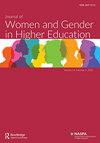“It Takes a Village:” Reentry Women’s Perseverance in Completing a Clinical or Counseling Psychology Doctorate
Q2 Social Sciences
Journal of Women and Gender in Higher Education
Pub Date : 2022-10-02
DOI:10.1080/26379112.2022.2134142
引用次数: 0
Abstract
Reentry women, or women who have reentered higher education after a gap in studying, are a population of graduate students who have a unique set of challenges compared to their traditional counterparts. In addition, professional psychology programs place additional demands on students that can add to the unique challenges of reentry women. This study sought to examine how reentry women persist in navigating and succeeding in the challenges of clinical or counseling psychology doctoral programs. A theoretical purposive sample of 21 women from the United States and Canada participated. Data collection methods included a semi-structured interview with each participant, and data were analyzed using the constant comparative method of grounded theory. As a result of data analysis, four factors emerged that aided women in their pathways to persistence. Each of the factors had multiple categories that contributed to reentry women’s persistence, including: (a) intrinsic factors: maturational competence and goal grit; (b) extrinsic factors: support village and a climate of belonging; (c) identity factors: academic emersion, navigating liminal space, and professional identity claiming, and finally, (d) reinforcing factors: mastering milestones, maneuvering through barriers by meaning-making, and lucky events. Definitions of the factors, the emergent theoretical model, and the research implications are presented.“它需要一个村庄:”重新审视女性完成临床或咨询心理学博士学位的毅力
重返社会的女性,或在学习出现差距后重新接受高等教育的女性,是一群研究生,与传统同龄人相比,她们面临着一系列独特的挑战。此外,专业心理学项目对学生提出了额外的要求,这可能会增加重返社会女性的独特挑战。这项研究试图检验重返社会的女性如何在临床或咨询心理学博士项目的挑战中坚持并取得成功。来自美国和加拿大的21名女性参加了理论上有目的的抽样调查。数据收集方法包括对每个参与者进行半结构化访谈,并使用扎根理论的恒定比较方法对数据进行分析。数据分析的结果是,出现了四个有助于女性坚持的因素。每一个因素都有多个类别有助于女性重返社会的持久性,包括:(a)内在因素:成熟能力和目标毅力;(b) 外在因素:支持乡村和归属感;(c) 身份因素:学术涌现、驾驭极限空间和职业身份主张;最后,(d)强化因素:掌握里程碑、通过意义创造克服障碍和幸运事件。介绍了影响因素的定义、涌现理论模型以及研究意义。
本文章由计算机程序翻译,如有差异,请以英文原文为准。
求助全文
约1分钟内获得全文
求助全文
来源期刊

Journal of Women and Gender in Higher Education
Social Sciences-Gender Studies
CiteScore
1.40
自引率
0.00%
发文量
20
 求助内容:
求助内容: 应助结果提醒方式:
应助结果提醒方式:


